With David Cameron pledging a referendum on whether Britain should be in or out of Europe, even the property industry is split. EG hears two contrasting views
Trevor Abrahmsohn, managing director of super-prime agency, Glentree International
If a UK secession from the EU was accompanied by a robust trade agreement with Europe, there would be all manner of benefits.
Wealthy investors and entrepreneurs abhor the socialist-inspired EU. It is against enterprise and favours the work-shy and entitled, which is why Europe has on average at least 50% greater long-term unemployment than the UK.
An EU exit would result in a wave of employment for businesses in the UK. Those employed would require accommodation for rent and for purchase, which would be a boon for the property market in London and the rest of the UK. A newly unfettered government would presumably accelerate this process by means of grants and subsidies to new businesses without the need to refer this to “Big Brother” in Brussels. What a relief!
While France pushes for a 35-hour week and penal taxes for the rich, a “free Britain” would be shedding all the arthritic shackles of anti-commerce. The sluice gates would open to allow foreign investment to flow freely to this country.
Even if, as is speculated, Britain suffers from a marked-down sterling as a result of secession, this would be a perfect scenario for exporters and a fillip for dealing with our burgeoning trade surplus, which should start to fall.
You only need to look around the world to see that it is countries with a depreciated currency that are growing the fastest.
While wealthy investors import their valuable foreign earnings, the property markets in the UK would thrive.
Attracted by a lower corporation tax, investors would set up businesses in the UK. Perhaps VAT could be reduced, which would be a boost for consumers and retail spending.
We would need to find other markets for our exports, particularly among the emerging markets, so that we were not so dependent upon Europe.
I believe the economy would grow significantly. The expansion of supply, helped by the internet, would keep down inflation and unit costs, and interest rates would remain low, which would encourage further inward investment in the property market.
If we remain in the EU, we risk further interference from European-inspired regulation of the financial services market, which would discourage many of our wealthy brethren from investing in this sector.
Even without secession, we have been able to attract the wealthy from Europe. Free from European legislation, this trend would only increase.
James Roberts, head of commercial research, Knight Frank
The past two years have seen the EU experiment tested to the limit, with the single currency having fought (and, in my opinion, won) a battle for survival. But in the eyes of one of the EU’s more critical members, its credibility has dropped low. The British have long argued that it is the economic advantages the UK wants from the EU, not the attached baggage of regulation. Now even the economic benefits appear debatable after the long sovereign debt crisis. However, we should not judge the whole EU venture by the problems of the past two years.
I view the eurozone crisis as similar to the reunification of East and West Germany in the 1990s. A part of Europe requires structural reform and needs to emulate another part of Europe in its fiscal practices. Other more successful parts of Europe resent the expense they face, but secretly know their fortunes are intertwined with the weaker neighbour, which must be helped.
The process of reform has begun and will not finish soon, but it is showing signs of progress. Ireland has returned to the bond markets again, and Spain has not resorted to the bailout that until recently we were assured it desperately needed. In the UK we hear a lot of anti-euro propaganda.
We should note the success Germany has seen post-reform, and recall that it currently boasts an unemployment rate of just 5.4%, something Downing Street and the White House probably eye with deep envy.
A reformed eurozone economy will not mean that every region resembles southern Germany – even Germany cannot boast that. However, Europe has a series of super-regions – southern Germany, Paris/Ile de France, London and the South East of England – which drive growth and export it to the surrounding regions. Reform holds out the prospect of new super-regions in the future, and we should not underestimate the benefits of critical mass and the synergies arising from combining them into a single trade unit.
The British mostly accept the economic arguments – the point of conflict remains regulation. However, many of the rules that come from Brussels, particularly on health and safety, are found in most other advanced economies. In the US they have come about in response to civil litigation. One could argue that compulsory rules, not voluntary ones, are a loss of freedom, but surely this is splitting hairs. The EU offers the UK access to the planet’s largest market of first-world consumers, which justifies putting up with rules that would have come in anyway.











